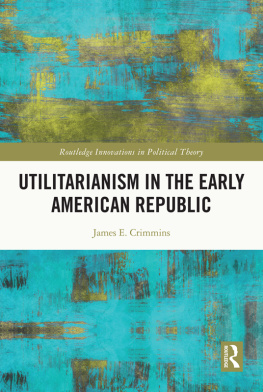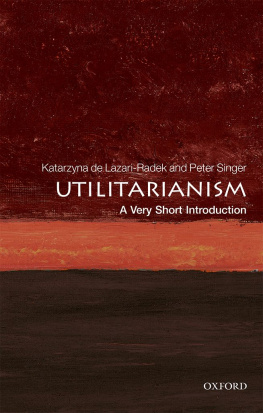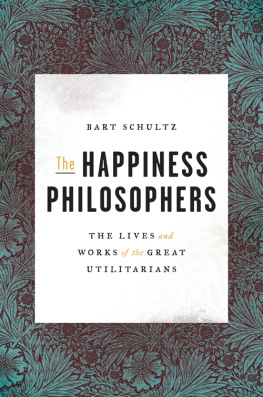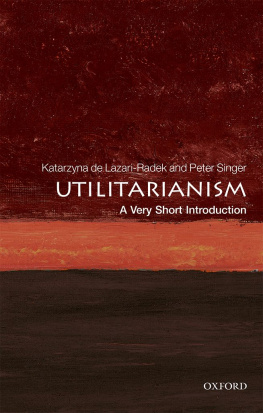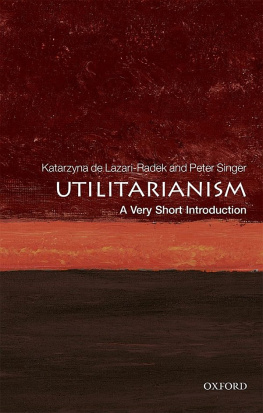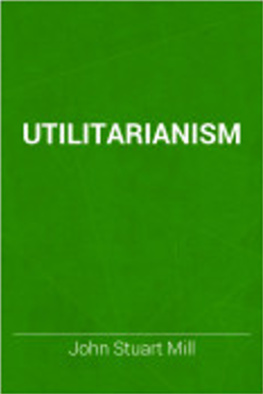J. J. C. Smart - Utilitarianism: For and Against
Here you can read online J. J. C. Smart - Utilitarianism: For and Against full text of the book (entire story) in english for free. Download pdf and epub, get meaning, cover and reviews about this ebook. City: Cambridge, year: 1998, publisher: Cambridge University Press, genre: Science. Description of the work, (preface) as well as reviews are available. Best literature library LitArk.com created for fans of good reading and offers a wide selection of genres:
Romance novel
Science fiction
Adventure
Detective
Science
History
Home and family
Prose
Art
Politics
Computer
Non-fiction
Religion
Business
Children
Humor
Choose a favorite category and find really read worthwhile books. Enjoy immersion in the world of imagination, feel the emotions of the characters or learn something new for yourself, make an fascinating discovery.
- Book:Utilitarianism: For and Against
- Author:
- Publisher:Cambridge University Press
- Genre:
- Year:1998
- City:Cambridge
- Rating:5 / 5
- Favourites:Add to favourites
- Your mark:
- 100
- 1
- 2
- 3
- 4
- 5
Utilitarianism: For and Against: summary, description and annotation
We offer to read an annotation, description, summary or preface (depends on what the author of the book "Utilitarianism: For and Against" wrote himself). If you haven't found the necessary information about the book — write in the comments, we will try to find it.
Utilitarianism: For and Against — read online for free the complete book (whole text) full work
Below is the text of the book, divided by pages. System saving the place of the last page read, allows you to conveniently read the book "Utilitarianism: For and Against" online for free, without having to search again every time where you left off. Put a bookmark, and you can go to the page where you finished reading at any time.
Font size:
Interval:
Bookmark:
for and against
J. J. C. SMART
Emeritus Professor
University of Adelaide Professor of Philosophy
Australian National University
BERNARD WILLIAMS
Provost of Kings College
Cambridge

CAMBRIDGE UNIVERSITY PRESS
Cambridge, New York, Melbourne, Madrid, Cape Town,
Singapore, So Paulo, Delhi, Mexico City
Cambridge University Press
32 Avenue of the Americas, New York NY 10013-2473, USA
www.cambridge.org
Information on this title: www.cambridge.org/9780521098229
Cambridge University Press 1973
This publication is in copyright. Subject to statutory exception and to the provisions of relevant collective licensing agreements, no reproduction of any part may take place without the written permission of Cambridge University Press.
First published 1973
27th printing 2008
A catalogue record for this publication is available from the British Library.
ISBN 978-0-521-09822-9 Paperback
Cambridge University Press has no responsibility for the persistence or accuracy of URLs for external or thirdparty internet websites referred to in this publication, and does not guarantee that any content on such websites is, or will remain, accurate or appropriate.
J. J. C. SMART
BERNARD WILLIAMS
J. J. C. SMART
J. J. C. SMART
Such writers as J. S. Mill, H. Sidgwick and G. E. Moore, as a result of philosophical reflection, produced systems of normative ethics. Of recent years normative ethics has become distinguished from meta-ethics, which discusses the nature of ethical concepts. Indeed, as a result of the prevalence of non-cognitivist theories of meta-ethics, for example those of C. L. Stevenson normative ethics has fallen into some disrepute, at any rate as a philosophical discipline. For non-cognitivist theories of ethics imply that our ultimate ethical principles depend on our ultimate attitudes and preferences. Ultimate ethical principles therefore seem to lie within the fields of personal decision, persuasion, advice and propaganda, but not within the field of academic philosophy.
While it is true that some ultimate ethical disagreements may depend simply on differences of ultimate preference, and while also the non-ultimate disagreements depend on differences about empirical facts, about which the philosopher is not specially qualified to judge, it nevertheless seems to me to be important to prevent this trend towards ethical neutrality of philosophy from going too far. The meta-ethical philosopher may far too readily forget that ordinary ethical thinking is frequently muddled, or else mixed up with questionable metaphysical assumptions. In the clear light of philosophical analysis some ethical systems may well come to seem less attractive. Moreover, even if there can be clear-headed disagreement about ultimate moral preferences, it is no small task to present one or other of the resulting ethical systems in a consistent and lucid manner, and in such a way as to show how common, and often specious, objections to them can be avoided.
It will be my object in the present study to state a system of ethics which is free from traditional and theological associations. This is that type of utilitarianism which R. B. Brandt has called act-utilitarianism.prove the act-utilitarian system. I shall be concerned with stating it in a form in which it may appear persuasive to some people, and to show how it may be defended against many of the objections which are frequently brought up against utilitarianism. Nevertheless I should like to indicate my opinion that the choice of conceptually clear and emotionally attractive systems of normative ethics which might be alternatives to it is not as wide as is sometimes thought.
In the first place, B. H. Medlinhowever, the conflict can be traced to some sort of confusion, perhaps even to some sort of superstitious rule worship. There is prima facie a necessity for the deontologist to defend himself against the charge of heartlessness, in his apparently preferring abstract conformity to a rule to the prevention of avoidable human suffering. Of course some deontologists might claim that though it is logically possible that their principles might conflict with the utilitarian one, in fact such a conflict would never occur. It seems that if such a deontology did exist, the utilitarian need not be concerned to defend himself against it, since its practical consequences would not differ from those of utilitarianism. However all deontological systems which are known to me do seem to differ from utilitarianism not only in theory but also in practice.
Such a persuasive objection to deontology is possible simply because we have assumed the truth of non-cognitivist (or possibly, subjectivist) meta-ethics. A cognitivist in meta-ethics of the type of Sir David Rossto show that the utilitarian can have no philosophically clearheaded rivals, but am merely trying to suggest that it is harder than is commonly believed to produce clear-headed and acceptable deontological systems of ethics, and that the range of these is probably not so wide as to embrace some of the well-known ones, such as that of Sir David Ross.
In setting up a system of normative ethics the utilitarian must appeal to some ultimate attitudes which he holds in common with those people to whom he is addressing himself. The sentiment to which he appeals is generalized benevolence, that is, the disposition to seek happiness, or at any rate, in some sense or other, good consequences, for all mankind, or perhaps for all sentient beings. His audience may not initially be in agreement with the utilitarian position. For example, they may have a propensity to obey the rules of some traditional moral system into which they have been indoctrinated in youth. Nevertheless the utilitarian will have some hope of persuading the audience to agree with his system of normative ethics. As a utilitarian he can appeal to the sentiment of generalized benevolence, which is surely present in any group with whom it is profitable to discuss ethical questions. He may be able to convince some people that their previous disposition to accept non-utilitarian principles was due to conceptual confusions. He will not be able to convince everybody, no doubt, but that utilitarianism will not be accepted by everybody, or even by all philosophically clear-headed people, is not in itself an objection to it. It may well be that there is no ethical system which appeals to all people, or even to the same person in different moods. I shall revert to this matter later on.
To some extent then, I shall be trying to present Sidgwick in a modern dress. The axioms of utilitarianism are no longer the deliverances of intellectual intuition but the expressions and others have worked out theories of logical relations between imperative sentences, and even mere expressions of attitude can be said to be consistent or inconsistent with one another.
Thus Boo to snakes is consistent with Boo to reptiles and inconsistent with Hurrah for reptiles. Indeed there is no reason why a non-cognitivist should refuse to call ethical sentences true or false. He can say Smith is good is true if and only if Smith is good. He can even say things like some of Buddhas ethical sayings are true, thus giving to understand that he would be in agreement with some of the attitudes expressed in Buddhas sayings, even though he is not telling, and even may not know, which ones these are. 1 must concede, however, that there are difficulties (attested to by the word would in the previous sentence) in giving a proper semantics on these lines. The semantics for would gets us into talk about possible worlds, which are dubious entities. Again consider a sentence like If it rains Smiths action is right. A non-cognitivist would perhaps interpret this as expressing approval of Smiths action in a possible world in which it is raining. However ethics, whether non-cognitivist or not, probably needs the notion of a possible world,may not really be worse off than the cognitivist. At any rate, I am assuming in this monograph that adequate non-cognitivist theories of meta-ethics exist.
Font size:
Interval:
Bookmark:
Similar books «Utilitarianism: For and Against»
Look at similar books to Utilitarianism: For and Against. We have selected literature similar in name and meaning in the hope of providing readers with more options to find new, interesting, not yet read works.
Discussion, reviews of the book Utilitarianism: For and Against and just readers' own opinions. Leave your comments, write what you think about the work, its meaning or the main characters. Specify what exactly you liked and what you didn't like, and why you think so.



